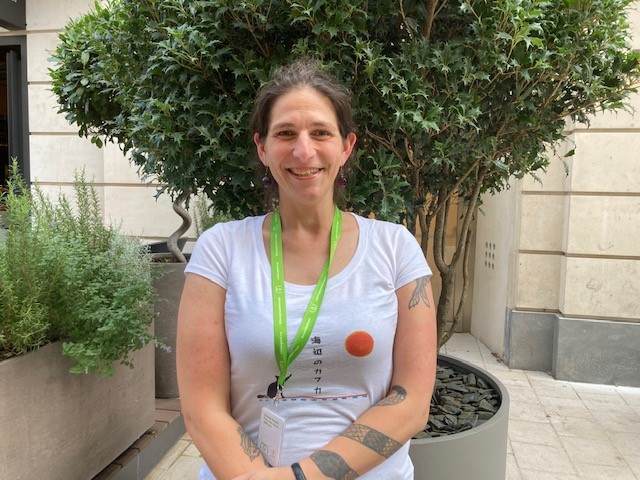Editor-in-Chief

University of Oxford, UK
Deputy Editors-in-Chief

Eva Heinz Liverpool School of Tropical Medicine, UK and KEMRI-CGHR, Kenya

Alan McNally University of Birmingham, UK
Senior Editors
Sarah Coulthurst University of Dundee, UK
Xavier Didelot The University of Warwick, Coventry, UK
Lindsay Hall University of Birmingham, UK
James O. McInerney University of Nottingham, UK
Iruka Okeke University of Ibadan, Nigeria
Editors
Francisco (Paco) Barona-Gómez Leiden University, Netherlands
Carlos Blondel Universidad Autonoma de Chile, Santiago, Chile
Josie Bryant Wellcome Sanger Institute, UK
David W. Cleary University Hospital Southampton, UK
Kerry Cooper The University of Arizona, USA
Daniel Croll University of Neuchâtel, Switzerland
Tim Dallman Utrecht University, The Netherlands
Chris Greening Monash University, Melbourne, Australia
Charlotte Houldcroft University of Cambridge, UK
Danielle Ingle University of Melbourne, Australia
John Lees EMBL-EBI, Cambridge, UK
John Moreau University of Glasgow, UK
Conor Meehan Nottingham Trent University, UK
Christos A. Ouzounis CPERI, CERTH, Thessaloniki, Greece
Caitlin Pepperell University of Wisconsin-Madison School of Medicine and Public Health, USA
Erin Price University of the Sunshine Coast, Queensland, Australia
Dave Rasko University of Maryland, Baltimore, USA
Sandra Reuter University of Freiburg, Germany
Jesse Shapiro McGill University, Montreal, Canada
Lori Snyder Kingston University, UK
Richard Stabler London School of Hygiene and Tropical Medicine, UK
Claire Turner University of Sheffield, UK
Daria Van Tyne University of Pittsburgh, PA, USA
Alan Walker University of Aberdeen, UK
Lucy Weinert University of Cambridge, UK
Koji Yahara National Institute of infectious Diseases, Tokyo, Japan
Zhiyong Zong Centre of Infectious Diseases, Sichuan University, Chengdu, PR China
Founding Editors
Stephen Bentley Wellcome Sanger Institute, Cambridge, UK
Nicholas Thomson Wellcome Sanger Institute, Cambridge, UK
Advisory Board
Angela Brueggemann University of Oxford, UK
Claire Fraser University of Maryland, Baltimore, USA
Kathryn Holt London School of Hygiene and Tropical Medicine, UK
Philippe Lemey University of Leuven, Belgium
Julian Parkhill Wellcome Sanger Institute, Cambridge, UK
Early Career Board of Reviewers
Ali Hadi Abbas University of Kufa, Iraq
Functional and comparative genomics, Bioinformatics, DNA and Total RNA library preparation and validation, Genome sequencing, assembly, annotation, functional and population genomics, zoonotic diseases, pathology and pathogenesis of zoonotic agents.
Gabriele Arcari Sapienza Università di Roma, Italy
My expertise lies in the genomics of antimicrobial resistant gram-negative bacteria, focusing on elucidating the genomic variations that contribute to resistance development, transmission dynamics, and the exploration of potential intervention strategies. I am passionate about advancing our understanding of how these mechanisms shape the landscape of antimicrobial resistance and its implications for public health.
Mahboobeh Behruznia Nottingham Trent University, UK
I'm interested in understanding the genetic population of microorganisms. AMR evolution: Understanding how antimicrobial resistance evolves and spread using experimental and sequencing approaches. Next-generation sequencing: Unravelling the genetic composition of microorganisms. Bioinformatics: Developing and using computational methods to analyse large genomic datasets. Metagenomics: Understanding the complex interactions between microorganisms and their environments.
Karol Ciuchciński University of Warsaw, Poland
Bioinformatics, metagenomics, identification of mobile genetic elements from (meta)genomic data, protein structure prediction, functional annotation, machine learning, extremophiles and extremozymes, bioprospection of extreme environments.
Elizabeth Darby University of Birmingham, UK
I’m interested in the molecular mechanisms of antibiotic resistance and how antibiotic resistance evolves/ develops in important human pathogens. I am also interested in the involvement of efflux pumps with respect to the development of resistance and active export of antibiotics out of the cell. Whilst not the subject of my doctoral dissertation, I am also interested in the gut microbiome and understanding it further in both health and disease.
Stephen Garrett Newcastle University, UK
Protein secretion systems and bacterial toxins in Staphylococcus aureus, homologous recombination of immunity gene repertoires.
Logan Newstead The Roslin Institute, University of Edinburgh, UK
My key research areas and interests are population structure, genomic epidemiology and adaptation of bacterial pathogens, with my own work being primarily based around veterinary pathogens and Streptocococcus species. My experience is based around short-read sequencing, phylogenomics, and pangenome analysis.
Kasia Parfitt University of Oxford, UK
My research interests are particularly in Burkholderia multivorans and Neisseria spp., next generation sequencing, phylogenetics, and phenotyping.
Anton Spadar The London School of Hygiene & Tropical Medicine, UK
Microbial genomics, Antimicrobial resistance, Bioinformatics, Mobile genetic elements, Horizontal gene transfer, Klebsiella pneumoniae, Salmonella typhi.
Jennifer Stiens Birkbeck, University of London, UK
Bioinformatician with research experience in genomics and signal transduction. I am particularly interested in non-coding regulation in pathogenic bacteria.
Jane Usher University of Exeter, UK
Candida, Genome sequencing, RNA-Seq, combinatorial stress, drug stress, high throughput screening, genetic interactions, human fungal pathogens, yeast, chemogenomics, stress resistance, AMR.
Rhys White The University of Queensland, Australia
Computational biologist focusing on microbial genomics, particularly in the field of pathogenic microorganisms.
Iman Yassine University of Oxford, UK
Antimicrobial susceptibility testing, antimicrobial resistance genes, whole-genome sequencing, bioinformatics for NGS, core genome multilocus sequence typing (cgMLST), PCR-based molecular methods.
Shing Zhan University of Oxford, UK
My research focuses on development of computational methods for large-scale genome sequence analysis. I have a diverse background in computational biology, evolutionary biology and ecology, and infectious disease diagnostics.
Board of Reviewers
Dario Leonardo Balacco University of Birmingham, UK
Microbiome, phylogenesis, evolution, bioinformatics, sequencing, RNA biology, gene regulation.
Jesus Blanco Imperial College London, UK
Short read sequencing, 16S, Bioinformatics, Illumina Miseq & Oxford Nanopore, human gut microbiome.
João Botelho Max Planck Institute for Evolutionary Biology, Germany
Molecular basis of antibiotic resistance mediated by different mobile elements in Pseudomonas aeruginosa isolates from clinical settings, evolutionary dynamics of bacterial and archaeal genomes, viruses and microbial populations.
Georgia Breckell Massey University Auckland, Albany, New Zealand
Assembly, long-read sequencing, Oxford Nanopore Technologies, microbial genomics, epigenome, DNA methylation, Restriction-Modification systems, methylome or variations on these.
Sebastian Bruchmann University of Cambridge, UK
Functional Genomics, Host-Pathogen Interaction, Antimicrobial resistance and prediction, TraDIS/Tnseq, RNA-seq, CRISPR interference screening, Whole genome sequencing, Klebsiella pneumoniae, Pseudomonas aeruginosa.
Kevin Chau University of Oxford, UK
Antimicrobial resistance, Whole genome sequencing, Metagenomics, Epidemiology, Wastewater, Molecular microbiology.
Bruno Francesco Rodrigues de Oliveira Fluminense Federal University, Niterói, Brazil
Comparative genomics, CAZyme, functional annotation, genome mining, genome-based taxonomy, holobiont, phylogenomics, Polysaccharide Utilization Loci (PUL), marine microbiology, sponge-associated bacteria.
Jessica Fletcher Trinity College Dublin, Ireland
Candida; yeast; fungi; virulence; CRISPR; ChIP, bacteria.
Claire Gorrie University of Melbourne, Australia
Microbial genomics, antimicrobial resistance, bacterial pathogens, bioinformatics, phylogenetics, healthcare-/hospital-associated, transmission, outbreak.
Angharad Green University of Liverpool, UK
Streptococcus pneumoniae, Pseudomonas aeruginosa, experimental evolution, variant analysis, whole genome sequencing, transcriptomics, metabolomics, host-pathogen interactions, phylogenomics, megaplasmids, industrial contamination.
Rebecca Hall University of Birmingham, UK
Selection pressure and metabolism in microbial communities, evolution and symbiosis, using techniques in microbiology, molecular biology and computational biology.
Jonathan Hira UiT The Arctic University of Norway, Tromsø, Norway
Bacterial genomics, Bacteria identification and taxonomy, Disease and infectious agent, Host-bacteria interaction, Marine animal microbiome, Tools in bacterial genome analysis.
Alba Iglesias Vilches Newcastle University, UK
Natural products, drug discovery, genome mining, metagenome mining, bacterial evolution and functional genomics.
Caroline Kobras University of Sheffield, UK
Antimicrobial resistance, AMR mechanisms, cell envelope, cell wall synthesis, Gram-positive bacteria (Bacillus subtilis, Streptococcus pneumoniae), functional genomics, transposon insertion sequencing, molecular genetics.
Kihyun Lee Seoul National University, Republic of Korea
Sequencing database and software; Microbial genomics and metagenomics; Microbiome; Antimicrobial resistance; Genome evolution and systematics.
Winnie Lee University of Bristol, UK
Salmonella, antimicrobial resistance, plasmids, transmission, phylogenetics.
Yang Li National Institute for Viral Disease Control and Prevention, Beijing China
Bioinformatics, metagenomics identification of pathogen from clinical samples and host response to infections, metagenomics; virus identification; bioinformatics pipeline; next generation sequencing, diagnostics; gene expression; respiratory infections; transcriptome.
Kevin Ma Harvard T.H. Chan School of Public Health, Boston, MA, USA
Genome-wide association, machine learning, regression models (especially applied to antimicrobial resistance), and Neisseria (particularly Neisseria gonorrhoeae).
Will Matlock University of Oxford, UK
Antimicrobial resistance (AMR), plasmids, genomics, Enterobacteriaceae, bioinformatics, environmental bacteria and mobile genetic elements (MGEs).
Christopher Mullally University of Western Australia, Perth, Australia
Genomics, pathogenesis, Neisseria, antimicrobial resistance, anti-virulence, commensal, fragment-based drug design.
Colman O'Cathail European Bioinformatics Institute (EMBL-EBI), Hinxton, UK
Mycobacteria, evolution, AMR, E. coli, bioinformatics.
Poppy Pescod University of Salford, UK
Nanopore, Illumina, Genome assembly, experimental evolution, insect symbionts, microbiomes, vector-borne disease.
Qin Qi Macquarie University, Australia
Mobile genetic elements, horizontal gene transfer, integrons, toxin-antitoxin systems, plasmids, antimicrobial resistance, compensatory mutations, fitness cost of resistance, experimental evolution, prokaryotic transcription regulation.
Leah Roberts European Bioinformatics Institute (EMBL-EBI), Hinxton, UK
Gram-negative bacteria, Whole genome sequencing, transmission/outbreaks, Long-read sequencing [Oxford Nanopore/Pacific Biosciences SMRT], Antimicrobial resistance, Mobile genetic elements/horizontal gene transfer.
Joshua Smith University of New Hampshire, Durham, NH, USA
Population genomics, microbial evolution, pan-genome, recombination, epidemiology, antimicrobial resistance, bioinformatics.
Stephania Tsola Queen Mary University of London, UK
Ecology, DMS, methane, archaea, bacteria, sediment, methanogens, sulfate-reducing bacteria, sequencing, marker genes, estuaries, rivers, lakes, wetlands, climate change, and microbial genomics.
Boas van der Putten University of Amsterdam, Netherlands
Bacteriology, antimicrobial resistance, pathogenesis, escherichia coli, evolutionary biology.
Nicholas Waglechner University of Toronto, Canada
Natural products, biosynthesis, glycopeptides, bioinformatics, antimicrobial resistance, evolution.
Yu Wan Imperial College London, UK
Bacterial whole-genome sequencing data, antimicrobial resistance, mobile genetic elements, horizontal gene transfer, and genomics of bacteriophages and human virus.
Yahan Wei University of Texas, USA
mitis group streptococci, cell-wall components, lipoteichoic acid, glycolipids, Streptococcus pneumoniae, Streptococcus mitis, bacterial pathogenesis, transcriptional regulation, iron-dependent regulation, RNA thermometer, and RNA sequencing.
Rebecca Weiser Cardiff University, UK
Microbiota, lung microbiome, respiratory infections, pseudomonas aeruginosa, burkholderia, bacteriophages, genomics.
Daniel Whiley University of Nottingham, UK
Microbiologist. Streptococcus. Helicobacter. Campylobacter. Cronobacter. Microbial genomics. Long and short read sequencing technologies. Whole genome analysis. 16S rRNA gene analysis with QIIME2. Comparative genomics. Evolution. Bacterial population genetic diversity. Phylogeny. Multilocus sequence typing and analysis. Transposon insertion mutagenesis and transposon insertion mapping/analysis. Genome wide association studies. Bacterial phenomics.
Maho Yokoyama Brighton and Sussex Medical School, UK
Microbial genomics (GWAS approach, metagenomics & antimicrobial resistance), gut microbiome, clinical.
Caroline Zellmer University of Cambridge, UK
Hospital epidemiology, infection control, microbial genomics, microbial therapeutics and responses to human interventions, Microbiome, outbreaks and epidemiological investigations, host microbiota interactions.
Edward Cunningham-Oakes University of Liverpool, UK
Antimicrobial Resistance, Microbial Genomics, Metagenomics, Infectious Disease Surveillance, Bioinformatics and Computational Biology.
